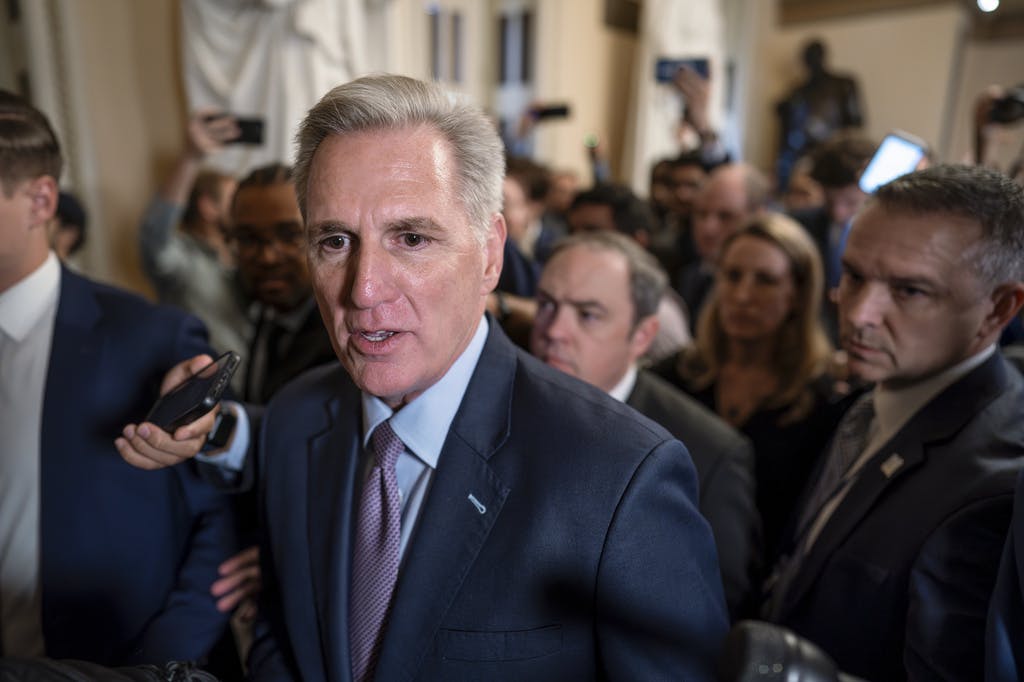The Job of the Next Speaker
For the leader who can articulate the cause of monetary reform, history beckons.

The tragic thing about the defenestration of Speaker McCarthy is that it is, at least as seen from the redoubt of the Sun, in large part of his own making. We’ve been saying this for months until we’re blue in the face. It is the failure of the Speaker to lift the sights of his own party — both mainstream and right wing — above the issues on which it keeps getting hung up in the budget and debt ceiling crises. And to lead the party to a more strategic approach.
Here we’re talking about monetary reform — starting with establishing a monetary commission to address where our 50-year experiment with fiat money is at the root of our problems. Fiat money means a dollar that is not defined in law and that is not redeemable on demand for gold or silver. We entered such a regime in the 1970s but Congress has never taken a strategic look at what fiat money has wrought. That review is now way overdue.
The Republican caucus in Congress knows that. As recently as 2012, the House passed Ron Paul’s bill known as Audit the Fed by a bipartisan vote of 327 to 98. That measure would have empowered Congress to take a much deeper and more strategic oversight of the Fed and its formation of monetary policy. The Congress has members and factions who comprehend the salience of this issue, but it lacks for a leader of vision who can move things along.
Mark that this needn’t be a parliament of flakes. The establishment of a monetary commission to review the question of what happened after the abandonment of Bretton Woods has been a plank in most of the Republican platforms in recent years. These have included 2012, 2016, and 2020. The last Speaker who tried doing something along those lines was Paul Ryan. Within weeks of becoming speaker he moved legislation to the senate.
There it got pigeonholed by a recalcitrant banking committee and has never been revived. No need to tell us that it can’t be done. We could underwrite the entire federal debt if we had a nickel from everyone who has told us that there is no interest in monetary reform in the Congress, that it won’t fly. Never mind that Congress can’t address the debt ceiling and has taken on staggering debts on which the interest rate is going to start soaring.
In our view, Mr. McCarthy found himself in the pickle he is in because of a leadership problem. Despite the outcry over inflation under President Biden, even from Democrats and labor unions, no one in the House leadership has put forth a program to address the monetary question, which — under the Constitution — belongs entirely to the Congress. That is, all of the monetary powers that the Constitution grants to our government are granted to Congress.
In navigating a path forward from the McCarthy speakership, the GOP faces a unique challenge, but it would be a mistake to subscribe to the view that the move has “plunged,” as the New York Times put it, the House “into chaos.” The Times sees this as “the culmination of a bitter power struggle” between the speaker and “a far-right faction” that was “trying to stymie his efforts to keep the government funded and the nation from defaulting on its debt.”
Such a view, retailed throughout the liberal press, overlooks the principled stance that animated at least some of Mr. McCarthy’s critics on the right. Even before Mr. McCarthy attained the speakership, the Times vilified the House rebels as “hard-right conservatives” on a “deeply ideological drive.” Yet their goals, as the Times described them, were in line with conservative principles: “to drastically limit the size, scope and reach of the federal government.”
The conflicts between Mr. McCarthy and the House rebels centered on taming the spiraling national debt and the federal overspending that fuels it. Twice, during the debt ceiling and shutdown debates, Mr. McCarthy worked with the Democrats to evade these questions. Left unsaid is that both problems stem from the fiat money regime that removed the brakes on government spending and borrowing that obtain under a gold standard.
Not that the Freedom Caucus is the only custodian of monetary reform. Honest money has been — and ought to be — the cause of mainstream Republicanism. And of Democrats who grasp the record of honest money, full employment, and growth. The GOP needs a leader who can explain this issue like Reagan once explained the need for tax reform and won 44 states in his first term and 49 for his second. History beckons.
________
This editorial has been expanded from the bulldog edition.

